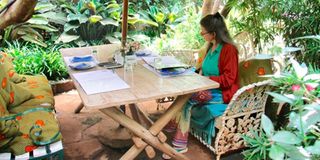Breaking News: CDF Francis Ogolla involved in KDF chopper crash
Tastes of Lebanon at Hob House

A table in a shrubbery nook.
It was last Sunday. We woke at first light to the gentle tapping of raindrops on the roof tiles. But by the time we drew open the curtains the brightness promised that the day would live up to its name.
I had booked a table at Hob House in Kitisuru, Nairobi for an early lunch. Now, that is a place that certainly lives up to its name. It is a restaurant with a Lebanese cuisine, and in Arabic ‘hob’ means ‘love’. A few minutes chat with the owner, Kelly, and you will know why she chose that name.
Everything about the place has been done with the kind of care you can call loving – the way the garden is rich in blossoms, the way each table is nested in flowering shrubs, the way the paper table mats tell the story of Hob House and its surrounding community of Mlango Farm that delivers organic vegetables for the restaurant, the Weaverbird hand weaving workshop, the Waithera Pottery, and the Cottage art and dance school.
On the back of the table mat, Kelly has written about the origins of pizza – the manouche, the flatbread of the Levant, topped with olive oil and local spices, and made by the Armenians, Babylonians Egyptians, Greeks and the Lebanese, right back to ancient times. Kelly not only knows about the cooking of Lebanese food, she knows about its history – and she tells it well.
Turbulent history
So, let me tell you something about the food. Lebanon has had a turbulent history – ruled in turn by the Egyptians, Persians, Romans and the French. And that is why the cuisine is so varied. But among the traditional dishes are the flatbreads, hummus and the shawarma meat cones – usually of lamb, mutton or chicken.
The Hog House menu has a good range of vegetarian and vegan dishes, and also Halal chicken, lamb and fish. And, knowing this emphasis of the menu, I went ready to go the vegetarian way. Because there is nothing plain or boring about the vegetarian dishes at Hob House; they have a colour, a variety and a delicacy. But I lost that plot when I saw what was the special dish of the day chalked up on a board: Grilled garlic buttered king prawns, served on a bed of kammounch with exotic spices from southern Lebanon. It really was special.
Lut, my wife, was familiar with the menu, having run a three-day yoga course there some time ago. (Yes, the place is also a guest house, accommodating up to 15 people, and there is a tent in the garden for small events and parties.) Lut chose green falafel as a wrap, served with tahini sauce and salad. I gladly finished off the creamy and delicious tahini sauce.
Organic chia seed
We shared two rather adventurous desserts: the Chia Seed Pudding, with organic chia seed, coconut, peanut butter and pomegranate seeds; the Oum Ali, called a delicious Egyptian delight, with filo pastry and exotic spices, topped with pistachio.
It was a meal to linger over, and we prolonged it with coffee. As the table mat told us, Hob House is set in an area that has a strong history of coffee plantations, and the restaurant has developed its own brand of coffee from locally grown beans. By the way, alcohol isn’t served, but Kelly is happy for you to take along your own, and there is a small corkage charge.
It was comfortable and relaxing in that shrubbery nook. There was a bird table nearby. And so we were entertained by some colourful visitors: very smart chestnut weavers, a tiny cordon bleu, a bronzy sunbird and an indigo bird.
Hob House is tucked away on Kinanda Road and behind the ISK school. But I suggest you Google it and follow the given directions. It is not an easy place to find – but the finding will be well worth it.
John Fox is Chairman of iDC Email: [email protected]




